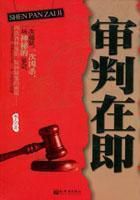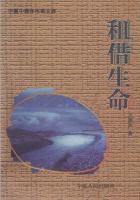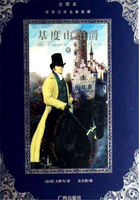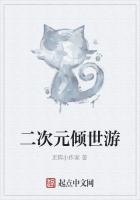On 27th January,1854,two men,stretched out at the foot of a gigantic weeping willow,were talking together,while they carefully watched the waters of the Orange River.This stream,called by the Dutch the Groote river,and by the Hottentots the Gariep,is a worthy rival of the three grand African arteries—the Nile,the Niger,and the Zambezi.Like them,it has its cataracts,its floods,and its rapids.Several well-known travellers have praised the purity of its waters and the beauty of its shores.
Here the Orange River,as it approaches the Duke of York mountains,offered a magnificent spectacle—unscaleable cliffs,imposing masses of rock,tree trunks fossilised by the action of time,deep caverns,impenetrable forests as yet unvisited by the settler and his axe,encircled by the background of the Gariep mountains,formed a scene incomparably beautiful.There the waters,pent up in too narrow a bed whose floor had fallen suddenly away,swept down in a fall of four hundred feet.Above the fall the surface of the water,broken here and there by a few rocky points projecting above tufts of green branches,swirled rapidly along.Below,the eye could hardly distinguish more than a dark whirlpool of water crowned by a thick cloud of vapour,tinted with the seven prismatic colours.A deafening roar from the abyss was intensified by the echoes from all sides of the valley.
Of these two men,doubtless brought together by the chances of exploration in this part of South Africa,one gave scant attention to the beauties which Nature spread before him.He was a hunter,a bushman—a fine type of that valiant race of the keen eye and quick gestures,whose wandering life is passed in the forest.The term bushman——an English word from the Dutch Boschjesman,—really means‘the man of the bush.’It is applied to the tribes who beat the country north-west of the Cape Colony.None of their families are sedentary;their life is spent in wandering about the district between the Orange River and the mountains to its east,in plundering the farms and destroying the crops of those tyrannical colonists who have driven,and are driving them back towards the arid regions of the interior,where there grows more stone than trees.
This bushman was about forty,and a fine tall fellow,evidently endowed with great muscular strength.Even in repose his body denoted activity in every limb.The ease and freedom of his attitude indicated energy and resolution—the sort of person cast in the same mould as the famous Leatherstocking,the hero of the Canadian prairies,though perhaps not so cool as Cooper’s favourite hunter.This was shown by the occasional colouringup of his face in response to the faster beating of his heart.
The bushman was no longer a savage like his ancestors the ancient Saquas;born of an English father and a Hottentot mother,this halfcaste had gained rather than lost by his contact with foreigners,and he could speak his paternal language fluently.His costume,half Hottentot and half European,consisted of a red flannel shirt,a jacket and breeches of deerskin,and catskin leggings.From his neck hung a small bag containing his knife,a pipe,and some tobacco.A sheepskin cap covered his head.Round his waist he wore a thick belt of native workmanship,and on his wrists were ivory rings,very skilfully carved by some Hottentot artist;a kaross,made of the skins of tiger-cats and leopards,hung from his shoulders down to his knees.A native dog lay dozing at his feet.The bushman drew short,quick puffs of smoke from his bone pipe,he gave unequivocal signs of impatience.
‘Now,Mokoum,do keep calm,’his companion told him,‘you’re really a most impatient man—except when you’re hunting!My worthy friend,you know we can’t change the order of things.The men we’re waiting for will be here sooner or later;they’ll come tomorrow,if they don’t come today.’
The speaker was a young man about twenty-five,and he offered a strong contrast to the hunter,keeping calm in his every action.There was no mistaking his origin:he was an Englishman;his‘bourgeois’attire showed that he was hot accustomed to travel—he seemed an employee astray in some savage wilds,and he was more like a clerk,or secretary,or some other variety of the great bureaucratic family.
Nor was he a traveller,but a distinguished man of science.William Emery was assistant-astronomer at the Cape Observatory,which had for many years rendered valuable services to science.
This savant,who was rather out of his element in this desert region of South Africa,several hundred miles from Cape Town,had great difficulty in curbing his companion’s natural impatience.
‘Mr.Emery,’the hunter replied in very good English,‘we have now been waiting a week at these Morgheda cataracts,our rendezvous on the Orange River.Now it’s a very long time since any member of my family has stayed a week in the same place.You forget that we’re wanderers,and when we keep still so long our feet begin to burn.’
‘Friend Mokoum,’the astronomer reminded him,‘the men we’re expecting are coming from England,and we can very well grant them a week’s law.You must take into consideration the length of the journey,the delays their steamer may have met with in ascending the Orange river,and,in a word,the thousand obstacles inherent in an expedition.We have been ordered to prepare everything for a journey to explore Southern Africa,and then to wait for my colleague Colonel Everest from Cambridge observatory,at the Morgheda Falls.Here we now are at the waterfall and here we must wait.What else would you have me do,my worthy bushman?’
The hunter evidently wanted to do something else,for his hand was continually playing with the lock of his rifle,with which he could hit a wild cat or an antelope at eight hundred yards with a conical bullet,for he had discarded the quiver of poisoned arrows still used by his countrymen in favour of European firearms.
‘But,Mr.Emery,are you sure you haven’t made any mistake?’asked Mokoum;‘was it at the Morgheda Falls,and at the end of January that you were to meet?’
‘Yes,my friend,’William Emery assured him quietly,‘here’s a letter from Mr.Airy,the Astronomer Royal at Greenwich Observatory,which will prove I’ve made no mistake.’
The bushman took the letter his companion offered him,and turned it over and over with the air of a man little acquainted with writing;then,handing it back to Emery‘Tell me again,’he said,‘what that bit of black-marked paper says.’
The young savant,gifted with patience proof against all trials,again began to tell his friend the hunter what he had already repeated a score of times.During the last week of December he had received a letter from Colonel Everest,giving him notice of his early arrival,accompanied by a scientific commission,whose destination was South Africa.What their plans were,or why they were coming so far down the African continent,Emery could not say,for on that point Mr.Airy’s letter was silent.
Following the instructions he had received,he had got ready at Lattakou,one of the most northern stations in the Hottentot country,waggons,provisions—in a word,everything necessary to equip a Boschjeman caravan;then,knowing the reputation of the hunter Mokoum,who had accompanied Anderson in his hunting expeditions in Western Africa,and David Livingstone,when he first explorecl Lake Ngami and the Zambezi Falls,he had offered him command of the caravan.
It was then arranged that the bushman,who knew the country perfectly,should take Emery with him to the banks of the Orange River,to the appointed rendezvous at the Morgheda falls.It was there that the scientific commission were to join them.This commission had sailed in the Augusta frigate and were to arrive at the mouth of the Orange River,on the west coast of Africa,off Cape Voltas,and then ascend the river as far as the cataracts.
William Emery and Mokoum had accordingly come with a waggon which they had left down in the valley,and which was to take the strangers and their baggage to Lattakou,unless they preferred following some tributary of the Orange River,after avoiding Morgheda Falls by a portage of some miles.
This having been once more duly impressed on the bushman’s mind,the latter advanced to the edge of the gulf into which the boiling river poured its waters below.The astronomer followed him;there,from a projecting spur,they were able to command the course of the stream below the cataract for several miles.
For a few moments Mokoum and his companion stood scrutinising the surface of the river,which resumed its tranquil course about a quarter of a mile down stream.Nothing—neither boat nor canoe—broke its surface.
It was then about three in the afternoon,and as,in the south,January corresponds with July in the north,the sun,almost perpendicular,heated the air to 105Fahrenheit in the shade.Had it not been for the westerly breeze,which moderated it in some degree,this temperature would have been unbearable for any one but a bushman;yet the young savant,all bone and muscle,did not suffer much from it:the thick foliage of the trees hanging over the gulf protected him from the rays of the sun.
Not a bird broke the solitude during the scorching hours of the day;not a beast left the shelter of the thicket to venture into the open ground.Nor could the slightest sound have been heard even if the cataract had not filled the air with its roaring.
After watching the river for ten minutes,Mokoum turned to Emery and stamped impatiently on the ground;his eyes,gifted as they were with great powers of vision,has found nothing.
‘Suppose your people don’t come?’he asked the young man.
‘They will come,my good hunter,’replied Emery;‘they are men of their word,and they’ll be as punctual as astronomers;besides,we have nothing to complain of.This letter announces their arrival by the end of January;today is the twenty-seventh,and they still have four days to reach the Falls.’
‘And if in four days they haven’t appeared?’asked the hunter.
‘Then,master bushman,we shall have a very good opportunity of exercising our patience,for we shall wait here till I’m certain they won’t come.’
‘By the god Ko!’the bushman cried loudly,‘I believe you’re capable of waiting until the Gariep stops pouring its waters into yonder gulf!’
‘No,my friend,not so,’Emery replied very quietly;‘reason must be the rule of our actions.Now what does reason tell us?Why,that if Colonel Everest and his companions,worn out by a fatiguing journey,perhaps in want of essential food,and lost in the solitudes of this region,should not find us at the rendezvous,we shall be to blame.Should any misfortune happen,the responsibility would justly fall on us;so it is our duty to remain at our post.
‘We lack for nothing here.Our waggon is below in the valley waiting for us,and gives us a safe shelter at night;we have food in abundance.Here Nature is to be seen in all her magnificence and she demands our admiration.It is a new happiness for me to pass a few days in these superb forests and on the banks of this matchless river.’
‘As for you,Mokoum,what more can you possibly want?Feathered and furred game abounds,and your rifle supplies us with our daily venison.Go and shoot,my brave hunter,and kill the time and the deer or buffalo together.Go at once,my good huntsman,while I watch for these laggards,and so at all events there’ll be no danger of your feet taking root here.’
The hunter felt the astronomer’s advice worth following,and decided to beat the neighbouring woods for a few hours.Lions,hyaenas,and leopards had no terrors for this Nimrod of the African forests,so he whistled to his dog Top.The intelligent animal,which seemed as impatient as its master,jumped up at him,and testified by its joyful bark its approbation of the huntsman’s plans.Hunter and dog soon disappeared under cover of the wood which formed the background to the cataract.
William Emery,left alone,lay down at the foot of the willow,and while awaiting the sleep which the great heat could not fail to induce,he began to ponder over his present situation.There he was,far from any inhabited region,close to the Orange River,which was still but little known.He was expecting Europeans—countrymen—who had left their homes to run the risks of an expedition in distant lands.
But what was the object of this expedition?What scientific problem could they seek to solve in the deserts of South Africa?What observations were to be made at the thirtieth parallel south?This is just what Mr.Airy,the Astronomer Royal,had omitted to state.They had requested his co-operation as a savant well acquainted with the climate of the southern latitudes,and,as it was evidently a scientific question,his services were,of course,at his colleagues’disposal.As the young astronomer put these questions to himself and found himself unable to answer them satisfactorily,he fell fast asleep.
When he awoke the sun was hidden behind the western hills,whose picturesque outline stood out clear against the flaming horizon.His stomach reminded him that supper-time was near.It was then six,time to regain the waggon down in the valley.
At that very moment he heard the report of a gun in the bushes close by,and almost at once the huntsman,followed by Top,appeared at the edge of the wood,dragging the animal he had just shot.
‘Come on,come on,Mister Purveyor!’cried Emery,‘what have you got for supper?’
‘A springbok,Mr.William,’replied the hunter,”pointing to an animal with horns like a lyre.
The springbok is common in the forests of South Africa.Its fur is cinnamon colour,and its hind-quarters are covered with a quantity of white,soft,silky hair,while its belly is marked with chestnut spots.Its flesh is excellent and would give them a plentiful supper.
Hunter and the astronomer carried the animal on a strong stick placed across their shoulders,and half an hour after leaving the cataract they reached the camp in the valley,where,guarded by two bushmen drivers,the waggon was waiting for them.















